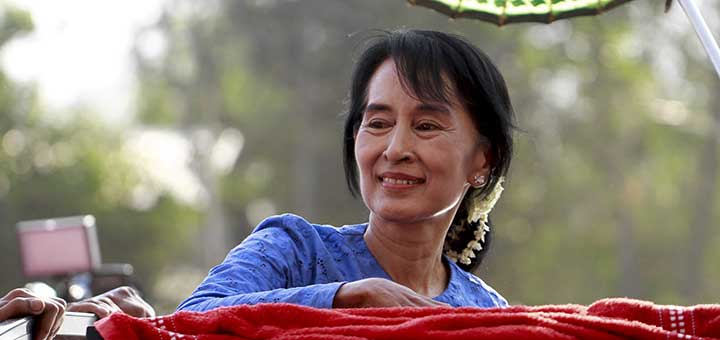Nobel Peace laureate Aung San Suu Kyi has committed her life to the non-violent struggle for democracy and human rights in Burma. Since 1988, she has been the leader of the democratic opposition and a voice of conciliation and unity among the regions and peoples of Burma.
Suu Kyi, freed from house arrest for nearly a year, had not been expressly banned from leaving her country. However, she feared she might not be allowed to return if she went abroad, so she stayed in Burma, devoting her life to the peaceful struggle for democracy and human rights.
She led her party, the National League for Democracy, to victory in 1990 elections, but military leaders refused to recognize the results. She spent most of the past two decades in jail or under house arrest.
Suu Kyi serves as the general secretary of the National League for Democracy, the leading opposition political party in Burma. In spite of efforts to suppress its activities, the party continues to meet, issue statements and seek to engage with the opposition. The group refused to participate in a vote last year, insisting the election was held under unfair and undemocratic conditions.
Burma, with a population of 55 million, remains a country in turmoil. Human rights activists continue to be harassed, arrested and jailed. Attacks against ethnic populations have escalated and grave human rights abuses against these populations have continued. Thousands of democracy activists and ethnic leaders remain detained as political prisoners in Burma, notwithstanding the government’s refusal to acknowledge their existence. The Red Cross has not been allowed to visit the prisons of Burma since 2006.
Recently the government has signaled a possible easing of repression, but the outcome remains highly uncertain. In August 2011, Suu Kyi met with President Thein Sein. She was quoted in news reports saying that the two had “found areas of agreement” and that she remains “a cautious optimist.” Suu Kyi has suggested that the United Nations conduct a fact-finding probe similar to the Truth and Reconciliation process spearheaded by Archbishop Desmond Tutu (also a Nobel Peace laureate and Wallenberg Medalist) in South Africa after the abolition of apartheid.
Undaunted and fearless through many years of detention and efforts to intimidate her, in speaking out for democracy and human rights in Burma, Aung San Suu Kyi exemplifies the courage and commitment to the humanitarian values of Raoul Wallenberg.

